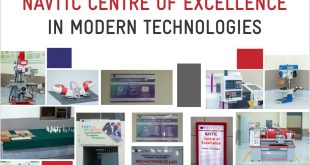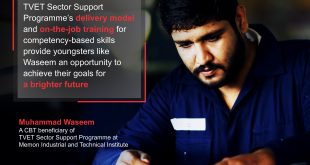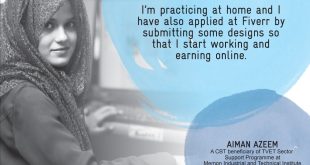Aashee, a transgender in her early 40s, had never thought of being in the limelight and praised extensively for her struggle and achievements. As a member of the marginalized community of transgenders, she had always faced discrimination at the hands of the society and even ridiculed and humiliated by people on several occasions.
She is just one of the many transgenders who are ignored altogether and no one cares how they live, earn their livelihood and strive for their survival. Barring a few younger and good-looking ones who can perform at weddings, events to celebrate childbirths etc, they live a miserable life.
Aashee is a symbol of change for many, especially her community members, as she has set up a small Industrial Garments Stitching (IGS) unit in her house where she, along with a few other transgenders, stitches garments for different textile units in the area. She takes orders from these factories, brings fabric home and delivers the orders within the deadline given to them.
 “This change did not come overnight. It was a long struggle and hats off to all those who cared for us and helped us live our dream,” she said while sharing her success story with visitors at a well-attended festival in Lahore.
“This change did not come overnight. It was a long struggle and hats off to all those who cared for us and helped us live our dream,” she said while sharing her success story with visitors at a well-attended festival in Lahore.
This festival named “Hunar Mela” was organized at the Children’s Library Complex by the Punjab Vocational Training Council (PVTC) in collaboration with Technical and Vocational Education and Training (TVET) Reform Support Programme from May 5 to May 6. TVET RSP is a multi-lateral initiative co-funded by the European Union, the Embassy of the Kingdom of the Netherlands, and the Federal Republic of Germany and is being implemented in Pakistan by theDeutsche Gesellschaft fur Internationale Zusammenarbeit (GIZ) GmbH. Aashee is a beneficiary of the IGS training course for transgenders conducted by the PVTC’s Vocational Training Institute (VTI) in Green Town with the assistance of TVET Reform Support Programme. The trainees were trained free of cost and given modest monthly stipend throughout the duration of the course. After completion of her training course, Aasheeapplied for a loan from a microfinance institution Akhuwat. Her application was approved and she got a loan and set up her-home-based unit.
The Hunar Mela showcased different training courses offered by PVTC all over the province. There were 21 stalls in total where well-informed trainers, trainees and the passed out students accommodated the visitors and informed them about the significance and relevance of these courses and demand for those trained in them in the job market.
 Of these 21 stalls, 7 represented the projects executed in the pilot phase of the Funds for Innovative Training (FIT) programme under TVET RSP. Besides, there was a stall of Halal Butchers’ training course which is currently under progress at VTI Green Town under the regular phase of FIT programme.
Of these 21 stalls, 7 represented the projects executed in the pilot phase of the Funds for Innovative Training (FIT) programme under TVET RSP. Besides, there was a stall of Halal Butchers’ training course which is currently under progress at VTI Green Town under the regular phase of FIT programme.
SuhaibShaukat, a trainer at VTI Panawan who was present at the stall on tunnel farming, said so far they had trained 8 batches of students who were benefiting a lot from what they had learned. He shared that around 76,000 acres of land was being used in the country for tunnel farming and this figure will increase fast.
 He shared it with visitors that tunnel farming offered premium rates to growers of off-season vegetables and was a highly viable option as landholdings were decreasing day by day. He said PVTC courses were offered free of cost and mainly meant for the deserving. A lot of people lived in the rural areas who could set up tunnel farms or find jobs at tunnel farms after doing this course, he concluded.
He shared it with visitors that tunnel farming offered premium rates to growers of off-season vegetables and was a highly viable option as landholdings were decreasing day by day. He said PVTC courses were offered free of cost and mainly meant for the deserving. A lot of people lived in the rural areas who could set up tunnel farms or find jobs at tunnel farms after doing this course, he concluded.
Shah JahanKhurram, a beneficiary of welding course at VTI Dera Ghazi Khan (DGK), said floods of 2012 wiped away their crop and damaged their house. They were fast losing hope but things changed when the VTI launched this course with the collaboration of GIZ. DGK would have long suspensions of electricity supply, so GIZ provided a generator which solved the problem. He said at the moment he was working as 3G welder at Atomic Energy Commission DGK and earning good salary. The event was attended by a large number of students from different schools and colleges, parents, relatives of prospective student and the general public.
Tariq Iqbal, 44, who works at a printing and designing house, said he was inspired by the quality of work done by trainees of VTI Sialkot in the field of screen printing. He said he would like to send his nephew there as they trained trainees in the field of computer programming, graphic designing, screen printing, computer pattern designing etc in just six months and also give them on job trainings for two months.
Tariq said he was inspired by Rizwan Ali and Naqqash Ahmed Toor, two students of the course, who were eyeing for jobs at leading export houses in Sialkot. He said there was a great potential in this field as manufacturers of sportswear, gloves, soccer balls, medical instruments etc needed catalogues to be printed in huge numbers. Besides, experts in computer graphic designing and screen printing were required in textiles, printing, plastic moulding and many other sectors. He said the potential of this trade in other cities is also huge.
 Shafqat-ur-Rehman, Manager, Research and Development (R&D) at PVTC said a large number of beneficiaries of FIT projects had attended the festival and he was pleased to know that many of them were doing jobs or their own businesses. The welding and fabrication courses in South Punjab had opened venues for flood-affected youth who could even get jobs in the Gulf region. The same was the case with transgenders, poor women, widows and members of the Christian community who had benefitted from FIT projects executed by PVTC and were earning money.
Shafqat-ur-Rehman, Manager, Research and Development (R&D) at PVTC said a large number of beneficiaries of FIT projects had attended the festival and he was pleased to know that many of them were doing jobs or their own businesses. The welding and fabrication courses in South Punjab had opened venues for flood-affected youth who could even get jobs in the Gulf region. The same was the case with transgenders, poor women, widows and members of the Christian community who had benefitted from FIT projects executed by PVTC and were earning money.
Pointing towards the stall on halal butchery, he said it was a landmark project as trainees would be certified by PVTC after the successful completion of their courses. This would happen for the first time in Pakistan. The certified professionals, he said, would be able to migrate to countries such as New Zealand, Australia, Canada and UAE, he said with an expression of awe on his face.
The other stalls set up at the festival were about trades including auto mechanic, motorcycle mechanic, agriculture & livestock, poultry and egg-hatchery, artificial insemination, tunnel farming, halal butchery, Auto CAD operator, Electronics Technician,Machinist, Fashion Designing computer textile designing, computer pattern designing, food cooking and kitchen organization.
Punjab Minister for Zakat and Usher Malik Nadeem Kamran said it was a pleasant surprise to know that around 73 per cent of the students passed out by PVTC since its inception were already doing jobs and businesses. “What else is needed to confirm the utility and relevance of this initiative and appropriate use of zakat money,” he expressed.
 Pakistan TVET REFORM Support Programme Technical and Vocational Education and Training (TVET) Reform support Programme
Pakistan TVET REFORM Support Programme Technical and Vocational Education and Training (TVET) Reform support Programme









